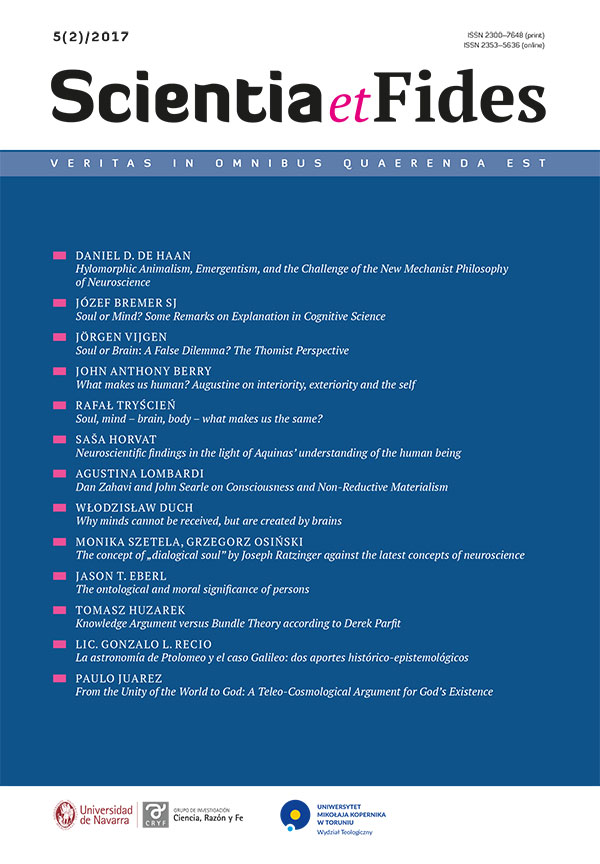Soul or Brain: A False Dilemma? The Thomist Perspective
Keywords
Thomas Aquinas, anthropology, soul, bodyAbstract
In this article I will claim that from a Thomist perspective the question “Soul or Brain: What makes us human?” presents us with a false dilemma and hence must as such remain an unanswerable question. In order to corroborate this claim I will do two things. First, I present the framework of a Thomistic anthropology in so far as it relates to the unity of soul and body in the human person. Next, I deal with the question that immediately results from this unity, i.e. the subsistence of the soul. From a Thomist perspective this question can be answered apart from any findings from neuroscience.
References
Albertus Magnus. 1895. Summa theologiae, edited by Augustus Borgnet, t. 33. Paris: Vivès.
Anzulewicz, Henryk. 2013. “Anthropology: The Concept of Man in Albert the Great.” In A Companion to Albert the Great, edited by Irvin M. Resnick, 325–346. Leiden / Boston: Brill.
Aquinas, Thomas. 2001. S. Thomae de Aquino Opera omnia, edited by Enrique Alarcón, Pampilonae: Ad Universitatis Studiorum Navarrensis. http://www.corpusthomisticum.org
Augustine, Aurelius. 1986. De quantitate animae, edited by Wolfgang Hörmann. Vindobonae : Hoelder-Pichler-Tempsky (Corpus Scriptorum Ecclesiasticorum Latinorum 89).
Augustine, Aurelius. 1955. De Civitate Dei, edited by Bernhard Dombart. Turnhout: Brepols (Corpus Christianorum Series Latina 48).
Augros, Robert. 2004. “Reconciling Science with Natural Philosophy.” The Thomist 68:105–141.
Balthasar, Hans Urs Von. 1951. Karl Barth. Darstellung und Deutung seiner Theologie, Köln: Hegner.
Barth, Karl. 1948. Kirchliche Dogmatik, Bd I/2, Zürich, EVZ.
Bazan, Bernardo C. 1997. “The Human Soul: Form and Substance? Thomas Aquinas' Critique of Eclectic Aristotelianism.” AHDLMA 64:95–126
Bieniak, Magdalena. 2010. The Soul-Body Problem at Paris ca 1200–1250: Hugh of St-Cher and His Contemporaries. Leuven University Press: Leuven.
Blankenhorn, Bernard. 2015. The Mystery of Union with God. Dionysian Mysticism in Albert the Great and Thomas Aquinas. CUA Press: Washington D.C.
Bochet, Isabelle. 2016. “Le corps: un poids pour l’âme. L’exégèse augustinienne de Sagesse 9, 15.” Revue des sciences philosophiques et théologiques 100:27–43.
Brock, Stephen L. 2005. “The Physical Status of the Spiritual Soul in Thomas Aquinas.” Nova et Vetera. (English Edition) 2:231–258.
De Boer, Sander. 2013. The Science of the Soul: The Commentary Tradition on Aristotle's De Anima, c. 1260 – c. 1360. Leuven University Press: Leuven.
Echavarría, Martín F. 2009. La praxis de la psicología y sus niveles epistemológicos según santo Tomás de Aquino. Editorial de la Universidad Católica de La Plata: La Plata.
Elders, Leo. 1997. The philosophy of nature of St. Thomas Aquinas. Peter Lang: Frankfurt am Main.
Emery, Gilles. 2000. L’unité de l’homme, âme et corps, chez S. Thomas d’Aquin. Nova et Vetera 75:53–76.
Emery, Gilles. 2007. Trinity, Church, and the Human Person. Thomistic Essays. Naples (FL): Sapientia Press.
Gondreau, Paul. 2008. “The inseparable connection between procreation and unitive love and Thomistic hylomorphic anthropology.” Nova & Vetera. (English Edition) 4:731–764.
Hasse, Dag N. 2000. Avicenna's De Anima in the Latin West. Warburg Institute: London.
Jonas, Hans. 1981. Macht oder Ohnmacht der Subjektivität? Das Leib-Seele-Problem im Vorfeld des Prinzips Verantwortung. Frankfurt am Main: Insel. (Das Prinzip Verantwortung. Erster Teilband: Grundlegung, edited by Dietrich Böhler and Bernadette Herrmann, 421–510. Freiburg im Breisgau: Rombach (Kritische Gesamtausgabe der Werke von Hans Jonas I,2a).
Kläden, Tobias. 2005. Mit Leib und Seele… Die mind-brain-Debatte in der Philosophie des Geistes und die anima-forma-corporis-Lehre des Thomas von Aquin. Regensburg: Friedrich Pustet Verlag.
Luyten, Norbert. 1963. “The significance of the body in a Thomistic anthropology.” Philosophy Today 7:175–193.
Marcel, Gabriel. 2001. The Mystery of Being. Translated by G. S. Fraser. South Bend IN: St. Augustine’s Press. (Original French: Le Mystère de l'être. Paris: Aubier, 1951).
Merleau-Ponty, Maurice. 2002. The Phenomenology of Perception. Translated by C. Smith. Routledge: London and New York. (Original French : Phénoménologie de la Perception. Gallimart: Paris, 1945).
Nicolas, Marie-Joseph. 1979. “Le corps humain,” Revue Thomiste 79:357–387.
Oguejiofor, Josephat O. 2001. The Philosophical Significance of Immortality in Thomas Aquinas. The University Press of America: New York.
Royal, Robert. A Deeper Vision: The Catholic Intellectual Tradition in the Twentieth Century. San Francisco: Ignatius Press.
Scarpelly Cory, Therese. 2016. “The Reflexivity of Incorporeal Acts as Source of Freedom and Subjectivity in Aquinas.” In Subjectivity and Selfhood in Medieval and Early Modern Philosophy, edited by Jari Kaukua and Tomas Ekenberg, 125–141. Dordrecht: Springer.
Scheffczyk, Leo. 2008. Katholische Glaubenswelt. Wahrheit und Gestalt. Paderborn: Schoeningh, 3. durchgesehene Auflage, Original edition 1977.
Wéber, Edouard H. 1991. La personne humaine au XIIIe siècle. Vrin :Paris.
Weisheipl, James A. 1980. Thomas d’Aquino and Albert, his Teacher. PIMS: Toronto.
Downloads
Published
How to Cite
Issue
Section
License
CC BY ND 4.0. The Creator/Contributor is the Licensor, who grants the Licensee a non-exclusive license to use the Work on the fields indicated in the License Agreement.
- The Licensor grants the Licensee a non-exclusive license to use the Work/related rights item specified in § 1 within the following fields: a) recording of Work/related rights item; b) reproduction (multiplication) of Work/related rights item in print and digital technology (e-book, audiobook); c) placing the copies of the multiplied Work/related rights item on the market; d) entering the Work/related rights item to computer memory; e) distribution of the work in electronic version in the open access form on the basis of Creative Commons license (CC BY-ND 3.0) via the digital platform of the Nicolaus Copernicus University Press and file repository of the Nicolaus Copernicus University.
- Usage of the recorded Work by the Licensee within the above fields is not restricted by time, numbers or territory.
- The Licensor grants the license for the Work/related rights item to the Licensee free of charge and for an unspecified period of time.
FULL TEXT License Agreement
Stats
Number of views and downloads: 1353
Number of citations: 1



